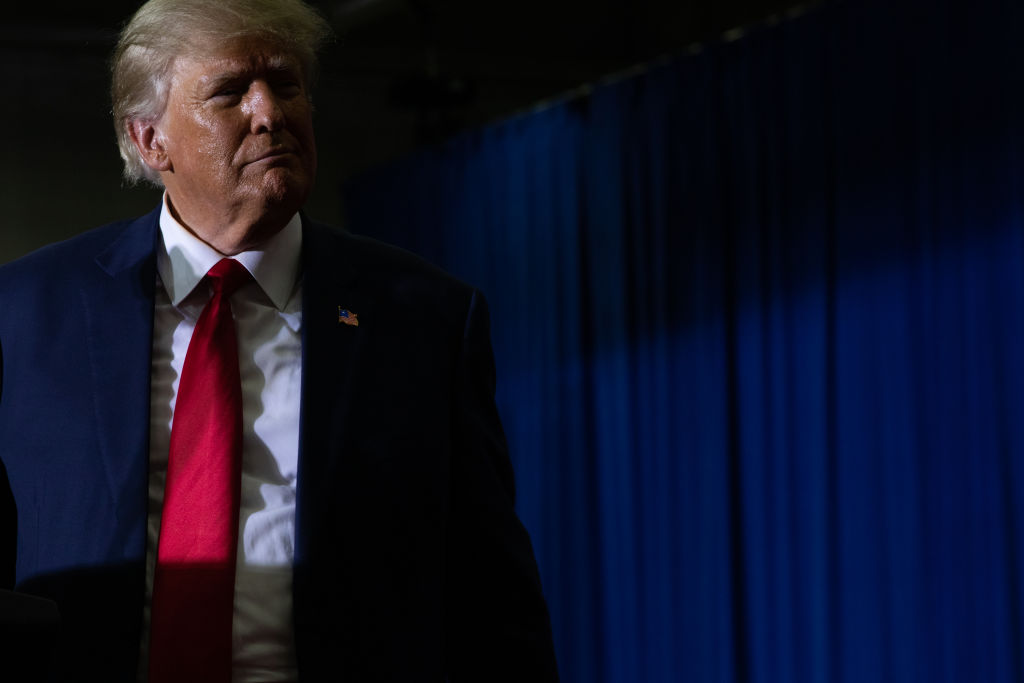
WARREN, MI – OCTOBER 01: Former President Donald Trump looks over at the crowd as he speaks during a Save America rally on October 1, 2022 in Warren, Michigan. Trump has endorsed Republican gubernatorial candidate Tudor Dixon, Secretary of State candidate Kristina Karamo, Attorney General candidate Matthew DePerno, and Republican businessman John James ahead of the November midterm election. (Photo by Emily Elconin/Getty Images)
Tuesday afternoon, October 4, former President Donald Trump filed an emergency appeal at the Supreme Court. It is the latest chapter in the battle over items seized in the August 8 FBI raid of Trump’s residence at Mar-a-Lago. His appeal asks the Supreme Court to step in and reverse an appellate ruling that let President Joe Biden’s Department of Justice lawyers regain access to many of the documents they collected. Under the ruling by the 11th Circuit Court of Appeals, government lawyers may now use the materials to develop criminal cases against Trump and others.
Emergency Appeal in Action
The filing by Trump’s legal team states:
“In what is essentially a document storage dispute … the Government has sought to criminalize President Trump’s possession and management of his own personal and Presidential records.”
 On September 5, Trump won a victory over the DOJ in a Florida federal court, challenging the Mar-a-Lago raid. Judge Aileen M. Cannon, a Trump appointee to the bench, granted his request for a special master to independently examine the evidence recovered during the search. Cannon ordered a review for any attorney-client and executive privilege claims the 45th president may have. Her decision forbade the DOJ from reviewing anything it took from Mar-a-Lago for criminal investigative purposes until the special master’s inspection was complete.
On September 5, Trump won a victory over the DOJ in a Florida federal court, challenging the Mar-a-Lago raid. Judge Aileen M. Cannon, a Trump appointee to the bench, granted his request for a special master to independently examine the evidence recovered during the search. Cannon ordered a review for any attorney-client and executive privilege claims the 45th president may have. Her decision forbade the DOJ from reviewing anything it took from Mar-a-Lago for criminal investigative purposes until the special master’s inspection was complete.
Independent Review Hurts DOJ Case
The DOJ appealed Cannon’s ruling in the 11th Circuit, arguing the wait imposed by the judge “irreparably harms the government by enjoining critical steps of an ongoing criminal investigation and needlessly compelling disclosure of highly sensitive records, including to Plaintiff’s counsel.” The DOJ won access back to about a hundred documents marked classified per a ruling by a three-judge panel from the Circuit on September 21. Two of the three judges were Trump appointees to the appellate court.

(Photo by Emily Elconin/Getty Images)
Trump’s emergency appeal rests not on the merits of arguments about document classifications but on procedural practices. It says, “The Eleventh Circuit lacked jurisdiction to review the Special Master Order” and that the government should be forced to wait to challenge Judge Cannon’s actions. Not all decisions a judge makes are appealable at every stage in the process. Trump’s lawyers argue that Cannon’s decision to have the DOJ wait on the special master was not properly reviewable by the 11th Circuit due to multiple procedural roadblocks. The emergency appeal says the original district court ruling did not abuse its discretion, and the September 5 order should be reinstated.
In an interview on Tuesday evening, the former president explained his motivation, saying the situation is “a weaponization by the DOJ. And I think it’s just something that has to stop … So we fight that battle; I think we’re doing very well in that battle.”
Justice Thomas to the Rescue?
The 11th Circuit handles appeals from Florida, and Justice Clarence Thomas oversees emergency appeals from that Circuit. Justices are assigned circuit courts to act on emergency appeals and may rule on them or refer them to the full Supreme Court for action. Thomas made no ruling on Trump’s request, but the justice asked for a response from the Biden administration and gave it a filing deadline of 5 p.m., Tuesday, October 11. The result has profound implications for the criminal case government lawyers are building based on the seized items.

